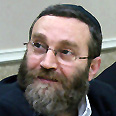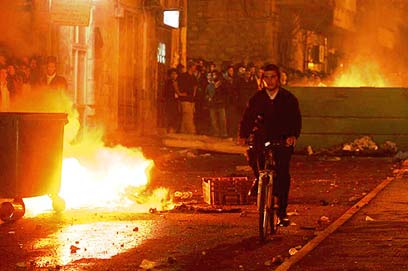
Haredim: On the defensive for 60 years
Secular public follows latest pride developments with bated breath while ultra-Orthodox community sees the Torah being pushed into a corner. 'At least the Arabs have someone to stand up for them, we're at the bottom of the ladder' says a haredi journalist
The current struggle against the 'abomination parade' is only one of the many struggles fought by Israel's ultra-Orthodox community against the ever secularizing state: Opening restaurants, theaters, shopping malls and main traffic routes during the Sabbath, stipends for children, reforming the religious councils, civil unions, conversion, the legal standing of rabbinical courts, autopsies….
As time passes the struggles seem to have become more difficult, and at times even bloody. The images of burning garbage containers and cars pelted by rocks will not doubt create a sense of déjà vu to the mid-90's riots demanding that main Jerusalem street Bar-Ilan be sealed off for traffic on Sabbath.
Maintain the 'status quo' Ben-Gurion had agreed decades ago when religious-secular arguments began to heat up, but for many in the ultra-Orthodox community the feeling is not one of a maintained status quo, but rather they feel that the religious community has been pushed into a corner. But even with Jerusalem up in flames over the upcoming pride parade ultra Orthodox journalist Betzalel Kahan's feathers haven't been particularly ruffled by the latest negative haredi stigma created by "a handful of zealots who make a lot of noise."
"Haredim are not violent and will not become violent," Kahan says, "there are fringe groups however. There have always been violent people, even during the days of the Temle."

'We don't exist in this country' (Photo: Gil Yohanan)
Kahan represents the ultra-Orthodox mainstream, writing for haredi weekly 'Yated Neeman'. "The secular public may not be violent when they protest," he says, "but they are violent in other ways. There is a tremendous force of emotion here, the most holy and precious thing is being damaged here – Jerusalem. That is one of the most serious offences in the Torah."
Looking at the bigger picture of religious vs. secular battles though, Kahan says he's tired of struggles. "We've been on the perpetual defensive for 60 years now," he says, "the state, which is losing its Jewish identity, always violates 'status quo' against us. We are growing as a community, a quarter of all first graders this year began school in haredi institutions, the larger we grow the more they try to impede the steps we take, we are always on the defensive."
"I understand the police, they are doing their job. They're trying to maintain the law, they cannot appear to be 'our' police but the state's police. I don't know how much influence Mazuz has here, but if the High Court interferes again and decided that the parade will be held, obviously there will be protests. The issue is not political – it's something that bothers everyone, hurts their feelings and elementary religion, it's not about politics.
Ruling leftist minority
Instead of the law of 'Human Dignity and Liberty' applying on the ultra-Orthodox public too, says Kahan, it only applies to "the leftist anti-religion loud minority." "In Israel," he says, "there is a hierarchy and this group is at the top and everyone else is below them. We're at the bottom and once you're there you'll do anything to leave that spot. We don't exist in this country, worse than the Arabs. The Arabs have people to defend them, we have no one, how am I supposed to feel in this country?"
Kahan is angry with the state, with the courts, with the media. "This isn't freedom of speech, it's freedom of humiliation," he says, quoting MK Moshe Gafni.










